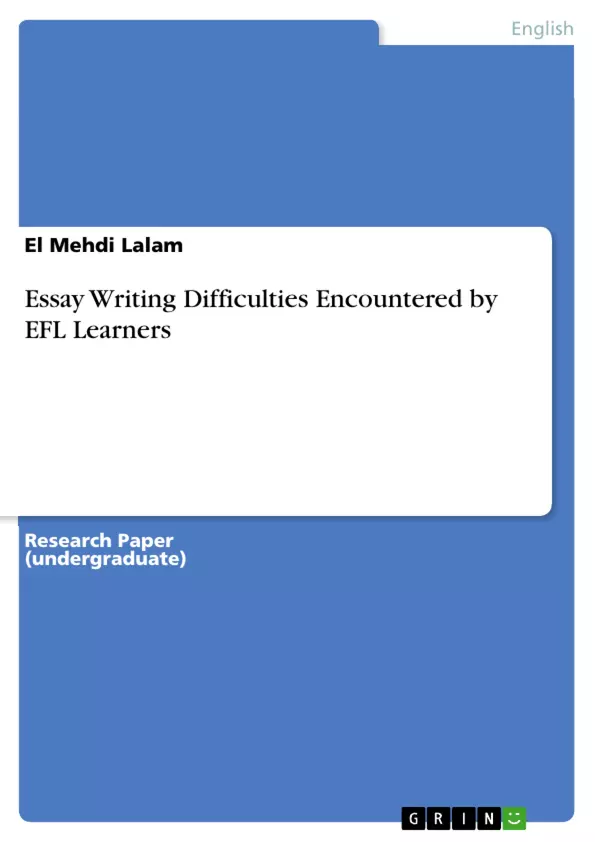It is known that EFL learners strive to be skilful at the four language skills namely: reading, listening, speaking and writing. It should be noted that each of them has its own value. Compared to other skills, mastering writing, in any human language, requires much time and effort. Undoubtedly, the process of mastering good writing skills involves encountering numerous difficulties. The present study aims primarily at identifying the difficulties encountered by EFL learners in essay writing. To carry out this research, a questionnaire is used to collect data. The questionnaire was administrated to students at university Sultan Moulay Slimane, Beni Mellal. A final remark to be made is that the results reveal that most students face difficulties in grammar, spelling, coherence, vocabulary, prepositions and punctuations.
Table of Contents
- General Introduction
- Statement of the Problem
- Introduction
- Aims of the Study
- Research Questions
- Significance of the Study
- Scope of the Study
- CHAPTER I Review of Literature
- Introduction
- Definitions of Terms
- Writing
- Writing Difficulties
- Essay
- The Historical Background
- History of English Language in Morocco
- Approaches Used in Teaching Essay Writing Skills
- The Product Approach
- The Process Approach
- The Genre Approach
- The Writing Process
- pre-writing
- Drafting
- Revising
- Editing\ Proofreading
- The Difficulties Encountered by EFL Learners in Essay Writing
- The Substantial Causes behind Students’ Mistakes in Essay Writing
- Ways to Upgrade Students Writing skills
- Developing the Habit of Reading
- Provision of Feedback on Students’ Written Essays
- Collaborative Writing
- Supporting
- Using Music
- Previous Studies
- Conclusion
- CHAPTER II Research Methodology
- Introduction
- Research Method
- Research Instruments
- The Questionnaire
- Research Participants
- Conclusion
- CHAPTER III Results and Discussion
- Results
- Introduction
- Students Writing Difficulties
- Spelling Difficulties
- Lexical Difficulties
- Grammatical Difficulties
- Punctuation Difficulties
- Coherence Difficulties
- Preposition Difficulties
- Other Writing Difficulties Encountered by EFL Learners
- Conclusion
- Discussion of the Attained Results and Recommendations
- Discussion of the Attained Results
- Recommendations
- Conclusion
- Results
- GENERAL CONCLUSION
Objectives and Key Themes
This research paper aims to determine the difficulties encountered by EFL learners, specifically students at Sultan Moulay Slimane University, in essay writing. The study investigates the challenges these learners face in their writing process, analyzes the potential causes behind their mistakes, and explores strategies to improve their essay writing skills.
- Challenges in Essay Writing for EFL Learners
- Influence of L1 (Arabic) on L2 (English) Writing
- Impact of Limited Vocabulary and Lack of Reading on Writing Quality
- Strategies for Improving Essay Writing Skills
- The Role of Teacher Support and Feedback
Chapter Summaries
The first chapter provides a detailed overview of essay writing difficulties, including definitions, historical context, teaching approaches, and stages of the writing process. It explores the challenges EFL learners face, examines the causes of writing errors, and presents various strategies to enhance writing skills. The second chapter outlines the research methodology employed in the study, including data collection methods (questionnaire) and analysis procedures. The third chapter presents the findings of the study, analyzing the difficulties encountered by Sultan Moulay Slimane University students in essay writing. It examines specific issues related to spelling, vocabulary, grammar, punctuation, coherence, and prepositions. The chapter also explores additional writing difficulties identified by the students and offers recommendations for improving their writing skills.
Keywords
The primary focus of this research paper revolves around the difficulties encountered by EFL learners in essay writing, with a specific focus on the case of Sultan Moulay Slimane University students. Key themes include language interference, vocabulary limitations, grammatical errors, punctuation challenges, and coherence issues. The study also explores the role of reading habits, teacher support, and feedback in improving writing skills.
- Citar trabajo
- El Mehdi Lalam (Autor), 2018, Essay Writing Difficulties Encountered by EFL Learners, Múnich, GRIN Verlag, https://www.grin.com/document/457637



